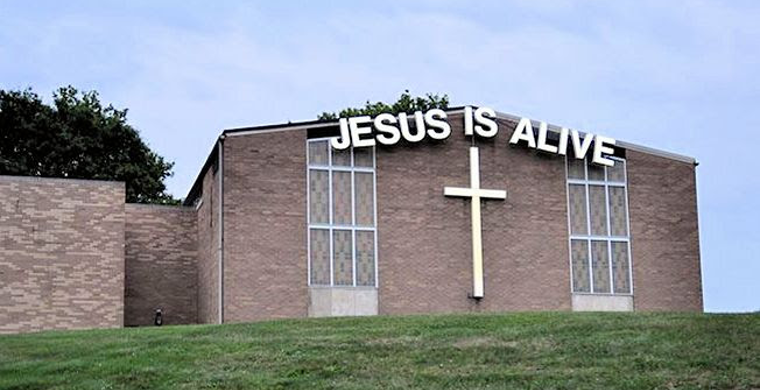MONROEVILLE, PA: Former Historic Evangelical Episcopal Parish Goes on Chopping Block
By David W. Virtue DD
www.virtueonline.org
November 3, 2015
"Jesus is alive," says a sign over the church. The church, however, is closed and dead, killed off by the culture wars in The Episcopal Church.
Pansexuality killed this once thriving evangelical, charismatic parish, a church that saw the beginnings of the Anglican Church in North America, the formation of Trinity School for Ministry and much more.
St. Martin's, Monroeville was a center of evangelical renewal in the Diocese of Pittsburgh. Now under Dorsey W. M. McConnell, Bishop of the Episcopal Diocese of Pittsburgh, it has admitted defeat and closed its doors forever.
In a letter on the diocesan website, McConnell wrote, "As I am sure you are aware, there has not been an active Episcopal Church congregation worshiping at St. Martin's for several years, and the diocese now intends to sell the property.
VOL sent an email to the bishop and asked him if he would consider selling it back to its original owners. We never got an answer. Based on past history and what the former Presiding Bishop ordered her bishops to do, Episcopal bishops have not been allowed to sell church buildings back to any Anglican congregation. Jefferts Schori has instead preferred to sell them to future saloon owners (her favorite) or for mosques.
Fr. Kua Apple, who leads the breakaway St. Martin's Anglican Church, which meets over the road at Bethel Presbyterian Church, said the whole congregation of about 50 left in 2012. "We did not sue to stay. We left on good terms. We polished the silver, made sure the boilers were working, and left."
Three unaffiliated congregations tried to make a go of it. Two were Pentecostal congregations; the other was a Metropolitan Community Church (MCC)--gay--congregation. None could meet the considerable asking price to buy and maintain the large physical plant at St. Martin’s
HISTORY
The church's history is one of sound evangelical conviction. Its founding rector was the late Fr. George Stockhowe. Many still remember him for his ability to blend classical theology and traditional liturgy with fresh ideas in worship and lay ministry. His book, Jesus Is Alive, recounts St. Martin's rise to fame (or notoriety) as a church unafraid to ask questions.
McConnell, who calls himself an evangelical but rolled over on the gay issue and now allows same sex marriages to priests who wish to perform them, admits that it was a "Spirit-charged community with clergy members and lay leaders alike fostered by that charism."
Fr. Apple himself hails from Hawaii and formerly had a distinguished career in science and technology. He received pastoral training at Trinity School of Ministry in Ambridge and became St. Martin's pastor in 2011. He also fills chaplaincy roles in the area.
In September 2003 in response to the 2003 General Convention's consent to the election of the openly homosexual Gene Robinson as Bishop of New Hampshire, St. Martin's hosted a meeting for parishes opposed to the direction of the national Episcopal Church.
Drawn by an appeal from diocesan bishops Robert Duncan the diocese met to discuss their future.
At that time he read a prepared statement addressing financial concerns, timelines, and the way forward in mission. Bob Devlin, chancellor for the diocese, and members of the standing committee responded to questions and concerns from parish leaders. Duncan and the Standing Committee later sought a negotiated settlement with the national church, but that failed.
The Bishop and Standing Committee affirmed the position later adopted by the Anglican Church in North America at the founding Assembly meeting in Bedford, Texas in June 2009. Later following the assembly the Anglican Diocese of Pittsburgh amended their own local canons stating that "all parish property is owned by the parishes" without any trust claim by the diocese.
Today the ACNA has more than 120,000 members, nearly 1,000 parishes in 31 dioceses in the US and Canada.
In many ways the death of this parish symbolizes the state of the Episcopal Church. Across the country Episcopal parishes are closing. What is symbolically interesting about St. Martin's is that it was the parish that saw the birth of the ACNA, which has gone on to better and brighter things, while the death of the parish symbolizes the inevitable death of The Episcopal Church. Symbolism is clearly everything.
END
UPDATE: A deconsecration service was held on Saturday afternoon November 7 presided over by Bishop McConnell and former St Martin’s Assistant, the Rev Dr. Jim Simons. About twenty person attended the service. Dr. Simons posted the following on his Facebook page: “The Charismatic church in Pittsburgh in the 70's. Hundreds came to faith here. I was the Asst. Rector from 1985-88, was ordained priest here (1985), and my son baptized here. They left TEC during the schism and couldn't maintain the building. Abandoned, vandalized, and now for sale. I celebrated the last Eucharist today. Bittersweet”. To set the record straight, the Anglican congregation left the building only when it became clear that TEC would not negotiate a reasonable settlement with them to gain title to the property. The Anglicans refused to expend hundreds of thousands of dollars in deferred maintenance on a property they could not own. The TEC diocese never attempted to plant a new Episcopal congregation at the facility or invest their own funds in the property.














